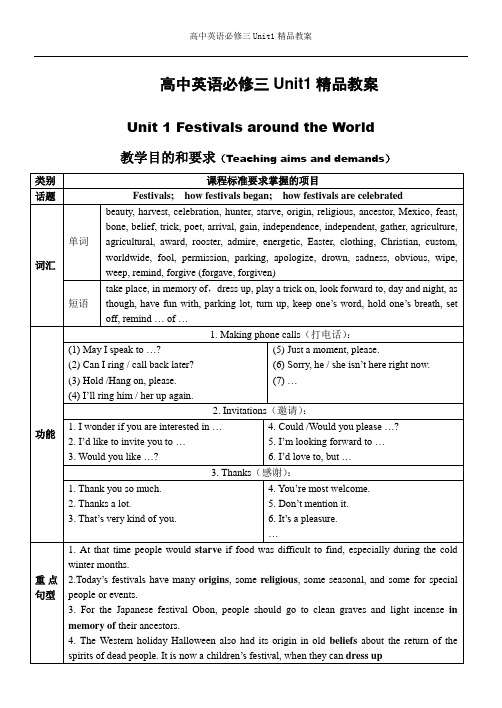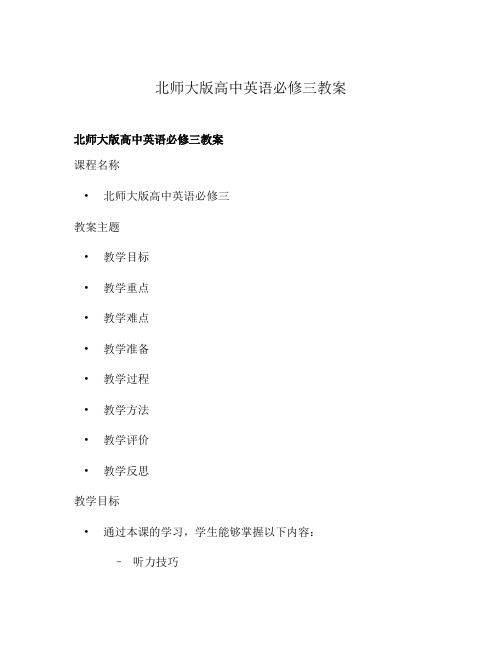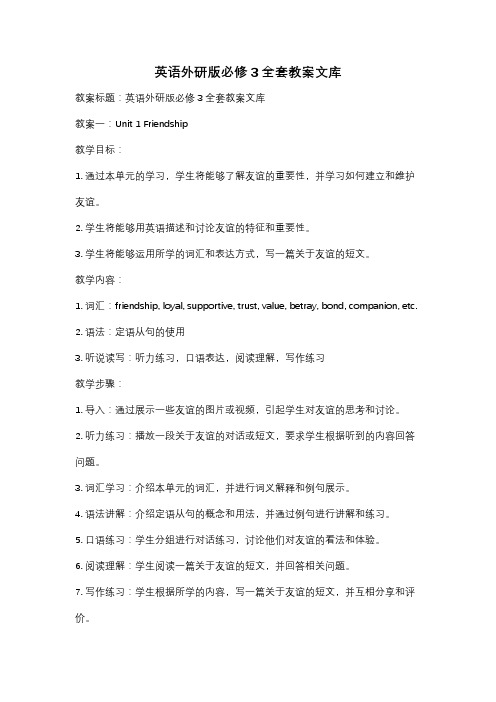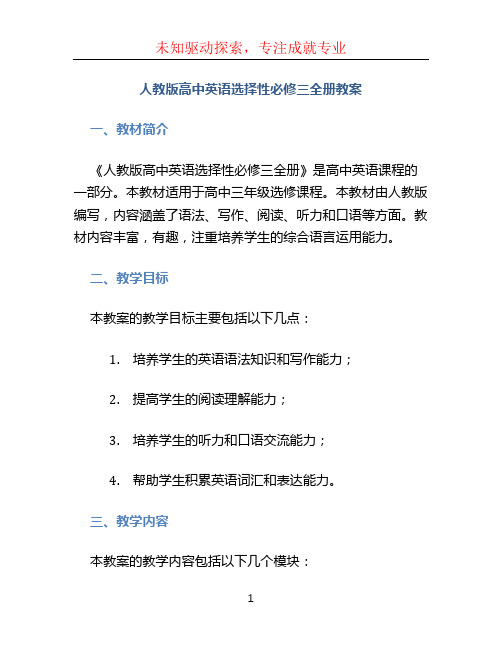高中英语必修三教案
高中英语必修三Unit1精品教案

高中英语必修三Unit1精品教案Unit 1 Festivals around the World 教学目的和要求(Teaching aims and demands)Period 1 Warming up & pre-readingDate: _________________ Name:___________________Teaching targets:Knowledge and ability objectives:1.To learn about festivals in different parts of the world and compare them2.To get more words about festivals and customs3.To talk about festivals and express ideas by using the wordsStrategy objectives:By means of task-based language teaching, students can participate in pair and group work to get more information about festivals around the world and think more about the topic Moral objectives: By comparing and contrasting the cultures in China and other countries, students can understand the cultural differences between countries, show respect for other culture and customs andlove Chinese culture.Important points:To talk about the festivals around the worldDifficult points:To know about the reasons for the celebrationsTeaching aids :MultimediaTeaching procedure:Task 1 BrainstormingWork in groups and list below Chinese festivals or holidays that you know.Chinese festivals & Holidays:1.Spring Festival2. The Lantern Festival3. Tomb Sweeping Day4.The Dragon Boat Festival5.The Double Seventh Festival6.The Mid-Autumn Festival7.The Double Ninth Festival8.New Year’s Day(元旦)9.International Women’s Day 10.International Labour Day11.Childre n’s Day12.National Day……Task 2 BrainstormingWork in groups and list below Western festivals that you know.Western festivals:1.Valentine’s Day2.Easter(Mar--April)3.April Fool’s Day4.Mother’s Day (in May)5.Father’s Day (June)6.Halloween (Oct.31)7.Thanksgiving Day (November)8.Christmas9. 10. ……Task 3: DiscussionFestivals are meant to celebrate important times of year. Then work in groups to discuss about when they take place, what they celebrate and what people do at that time.Task 4: Reading《三维设计》P2。
北师大版高中英语必修三教案

北师大版高中英语必修三教案北师大版高中英语必修三教案课程名称•北师大版高中英语必修三教案主题•教学目标•教学重点•教学难点•教学准备•教学过程•教学方法•教学评价•教学反思教学目标•通过本课的学习,学生能够掌握以下内容:–听力技巧–阅读理解技巧–语法知识–口语及写作能力•培养学生的学习兴趣和自主学习能力教学重点•重点学习本课的科目和语法知识•培养学生的听力和口语能力教学难点•解决学生在文章理解、语法使用等方面的疑惑•引导学生运用所学知识进行口语和写作练习教学准备•教材:《北师大版高中英语必修三》•多媒体设备•教具:PPT、黑板、课件等教学过程1.导入:–利用课件或黑板上展示相关图片或问题,引起学生的兴趣和思考,为本课的学习做铺垫。
2.听力训练:–播放与本单元相关的听力材料,要求学生仔细听并尝试回答问题,培养学生对听力材料的理解能力。
3.阅读理解:–讲解本单元的阅读材料,引导学生掌握阅读策略和技巧,例如划线标记关键信息、略读或扫读等。
4.语法学习:–介绍本单元的重点语法知识,并通过例句进行讲解和练习,帮助学生掌握语法规则和用法。
5.口语练习:–设计与本单元主题相关的口语练习活动,鼓励学生用所学知识进行表达,提高口语流利度和准确性。
6.写作训练:–引导学生写一篇与本单元主题相关的短文或作文,要求学生运用所学的词汇和语法知识进行写作练习。
7.课堂小结:–总结本节课的重点内容,让学生对所学知识有个整体性的认识,巩固学习成果。
教学方法•问答互动法:提问学生,引导学生思考和回答问题。
•情景模拟法:通过模拟真实情境,让学生进行口语表达练习。
•合作学习法:组织学生进行小组讨论、合作学习,促进信息交流和互动。
教学评价•通过观察学生的课堂表现、听力、阅读和口语练习情况等,进行评价。
•批改学生的书面作业和口头表达,给出建议和指导。
教学反思•反思教学过程中的不足和问题,如何提高学生的学习积极性、防止学生对学习内容的厌烦等。
人教版高中英语必修三全套教案

Module3 Unit 1 Festivals around the worldTeaching aims and demands1.topic: 1>Festivals2> how festivals begin3>how to celebrate festivals2.function: 1>RequestEg: Could you please…?Could I have …? I look forward to doing…2>ThanksEg: It’s a pleasure. /Don’t mention it.It’s very kind of you to…I’d love to …Thank you very much./Thanks a lot.You are most welcome.3.vocabulary:4.grammar:Jin can speak English well. (ability)Could you please show me the way to …? (request)May we see the awards for the team? (permission)She might give you … (possibility)The whole family will come for dinner. (promise)Often he would dress up like a rich man. (pass habit)We would be there with our friends. (promise)II.Key pointsPeriod 1-2 Warming up and fast reading1.Greetings2.Warming upStep 1 discussing the following questionsa.How was your holiday/spring festival?b.Did you go traveling?c.How much pocket money did you get?Step 2 talking1). Name some festivalsSpring Festival Dragon Boat Festival Lantam Festival Mid-Autumn Festival Army Day May Day Teachers’ Day New Year National Day Mother’s Day Children’s Day Father’s D ay Christmas Day Halloween carnival Easter Valentine Day Oben2).Ss work in groups of four and list five Chinese festivals and siscuss when theytake place , what they celevrate and one thing that people do at that time. Festivals Time of year/date Celebrate for Things to do Mid-Autumn DaySpring FestivalDragon Boat DayTomb sweeping DayLantern Festival3.Pre-reading1) What’s your favourite holiday of the year? Why?2) What festivals or celebration do you enjoy in your city or town? Do you likespending festivals with your family or with friends? What part of a festival do you like best—the music, the things to see, the visits or the food?4. Fast reading and find the answers to the following questions.A.What did ancient festivals celebrate?B.What are festivals of the dead for ?C.Why are autumn festivals happy events ? three things people do at spring festival ?Period 3-4 Intensive reading1.Read the passage paragraph and find the main ideas of each paragraphParagraph 1: All kinds of celebration in ancient time.Paragraph 2: The purpose to honour the dead and three examplesFestivals Time Things people doObenDay of the DeadHalloweenParagraph 3: The reasons Why we honour peopleFestivals Who does it celebrate ?Dragon Boat FestivalsClumbus DayIndian National FestivalParagraph 4: Autumn festivals are happy eventsParagraph 5: How people celebrate in spring festivals2.Language pointsa.They would starve if food was difficult to find…starve (v.)饿死;挨饿eg. Millions of people starved to death during the war.Starve for sth 渴望…Eg. The homeless children starve for love.Starvation (n.) 饿死Eg. Die of starvationStarvation wages 不够维持基本生活的工资b.The most ancient festivals would celebrate the end of the cold weather, plantingin spring and harvest in autumn.Celebrate (vt./vi.) 庆祝,赞颂,赞美,举行(仪式)Eg.We celebrate the new year with a party.Their courage was celebrated in all the newspaper.Celebrated (adj.) = famous 著名的,驰名的c. …because they thought these festivals would bring a year of plenty.days/years/…of plenty :富裕(尤指事物和钱)的日子,年月,生活等。
英语外研版必修3全套教案文库

英语外研版必修3全套教案文库教案标题:英语外研版必修3全套教案文库教案一:Unit 1 Friendship教学目标:1. 通过本单元的学习,学生将能够了解友谊的重要性,并学习如何建立和维护友谊。
2. 学生将能够用英语描述和讨论友谊的特征和重要性。
3. 学生将能够运用所学的词汇和表达方式,写一篇关于友谊的短文。
教学内容:1. 词汇:friendship, loyal, supportive, trust, value, betray, bond, companion, etc.2. 语法:定语从句的使用3. 听说读写:听力练习,口语表达,阅读理解,写作练习教学步骤:1. 导入:通过展示一些友谊的图片或视频,引起学生对友谊的思考和讨论。
2. 听力练习:播放一段关于友谊的对话或短文,要求学生根据听到的内容回答问题。
3. 词汇学习:介绍本单元的词汇,并进行词义解释和例句展示。
4. 语法讲解:介绍定语从句的概念和用法,并通过例句进行讲解和练习。
5. 口语练习:学生分组进行对话练习,讨论他们对友谊的看法和体验。
6. 阅读理解:学生阅读一篇关于友谊的短文,并回答相关问题。
7. 写作练习:学生根据所学的内容,写一篇关于友谊的短文,并互相分享和评价。
教学评估:1. 口语表达评估:观察学生在口语练习中的表达能力和语法运用情况。
2. 阅读理解评估:检查学生对于友谊相关文章的理解能力和问题回答的准确性。
3. 写作评估:评估学生写作能力和对友谊的理解和表达。
教案二:Unit 2 Healthy eating教学目标:1. 通过本单元的学习,学生将能够了解健康饮食的重要性,并学习如何选择和准备健康食物。
2. 学生将能够用英语描述和讨论健康饮食的原则和方法。
3. 学生将能够运用所学的词汇和表达方式,写一篇关于健康饮食的短文。
教学内容:1. 词汇:healthy eating, balanced diet, nutrients, vitamins, minerals, carbohydrates, protein, etc.2. 语法:情态动词的使用3. 听说读写:听力练习,口语表达,阅读理解,写作练习教学步骤:1. 导入:通过展示一些健康食物的图片或视频,引起学生对健康饮食的思考和讨论。
人教版英语必修三教案

人教版英语必修三教案【篇一:人教版英语必修3全套教案】人教版英语必修3 unit1-5 教案unit 1 festivals around the worldteaching aims and demands1.topic: 1festivals2 how festivals begin3how to celebrate festivals2.function: 1requesteg: could you please…?could i have …?i look forward to doing…2thankseg: it?s a pleasure. /don?t mention it.it?s very kind of you to…i?d love to …thank you very much./thanks a lot.you are most welcome.3.vocabulary:4.grammar: 情态动词的用法jin can speak english well. (ability)coul d you please show me the way to …? (request)may we see the awards for the team? (permission)she might give you … (possibility)the whole family will come for dinner. (promise)often he would dress up like a rich man. (pass habit)we would be there with our friends. (promise)ii.key pointsperiod 1 warming up and fast reading1.greetings2.warming upstep 1 discussing the following questionsa.how was your holiday/spring festival?b.did you go traveling?c.how much pocket money did you get?step 2 talking1). name some festivalsspring festival dragon boat festival lantam festival mid-autumn festivalarmy day may day teachers? daynew year national day mother?s daychildren?s day father?s daychristmas day halloween carnivaleaster valentine day oben2).ss work in groups of four and list five chinese festivals and siscuss when they take place , what they celevrate and one thing that people do at that time. then fill in the blanks.festivals time of year/date celebrate for things to domid-autumn dayspring festivaldragon boat daytomb sweeping daylantern festival3.pre-reading1) what?s your favourite holiday of the year? why?2) what festivals or celebration do you enjoy in your city or town? do you like spending festivals with your family or with friends? what part of a festival do you like best—the music, the things to see, the visits or the food?4. fast reading and find the answers to the following questions.a.what did ancient festivals celebrate?b.what are festivals of the dead for ?c.why are autumn festivals happy events ? three things people do at spring festival ?period 2-3 intensive reading1.read the passage paragraph by paragraph and find the main ideas of each paragraphparagraph 1: all kinds of celebration in ancient time.paragraph 2: the purpose to honour the dead and three examplesfestivals time things people doobenday of the deadhalloweenparagraph 3: the reasons why we honour peoplefestivals who does it celebrate ?dragon boat festivalsclumbus dayindian national festivalparagraph 4: autumn festivals are happy eventsparagraph 5: how people celebrate in spring festivals2.language pointsa.they would starve if food was difficult to find…starve 〔v.〕饿死;挨饿eg. millions of people starved to death during the war.starve for sth 渴望?eg. the homeless children starve for love.starvation (n.) 饿死eg. die of starvationstarvation wages 不够维持基本生活的工资b.the most ancient festivals would celebrate the end of the cold weather, planting in spring and harvest in autumn.celebrate (vt./vi.) 庆祝,赞颂,赞美,举行〔仪式〕eg.we celebrate the new year with a party.their courage was celebrated in all the newspaper.celebrated (adj.) = famous 著名的,著名的c. …because they thought these festivals would bring a yearof plenty.days/years/?of plenty :富裕〔尤指事物和钱〕的日子,年月,生活等。
人教版高中英语选择性必修三全册教案

人教版高中英语选择性必修三全册教案一、教材简介《人教版高中英语选择性必修三全册》是高中英语课程的一部分。
本教材适用于高中三年级选修课程。
本教材由人教版编写,内容涵盖了语法、写作、阅读、听力和口语等方面。
教材内容丰富,有趣,注重培养学生的综合语言运用能力。
二、教学目标本教案的教学目标主要包括以下几点:1.培养学生的英语语法知识和写作能力;2.提高学生的阅读理解能力;3.培养学生的听力和口语交流能力;4.帮助学生积累英语词汇和表达能力。
三、教学内容本教案的教学内容包括以下几个模块:1. 语法本模块主要包括以下几个知识点:•动词时态和语态•名词性从句•宾语从句•定语从句2. 写作本模块主要包括以下几个写作任务:•以某一主题为背景写一篇读后感•写一篇对某一事件的评论•写一篇简要说明某一原理或现象3. 阅读本模块主要包括以下几个阅读理解任务:•阅读一篇短文并回答相关问题•阅读一篇长文并总结并归纳文章的主要观点•阅读一篇对某一问题的分析,并写一篇观点陈述4. 听力本模块主要包括以下几个听力任务:•听一段对话并回答相关问题•听一段独白并回答相关问题•听一篇短文并完成相关填空任务5. 口语本模块主要包括以下几个口语任务:•情景对话练习•辩论练习•随机话题演讲四、教学方法为了达到教学目标,本教案将采用以下教学方法:1.教师讲授法:教师通过讲解语法知识点、写作要点、阅读技巧和听力技巧等内容,引导学生掌握相关知识和技能。
2.组织讨论:教师组织学生分组讨论,让学生在小组内交流和讨论教材内容,提高学生的口语表达能力。
3.实践活动:教师组织学生进行实践活动,如写作练习、口语演练和阅读小组讨论等,提高学生的综合语言运用能力。
4.自主学习:教师鼓励学生自主学习,通过阅读、听力和写作等活动,拓展学生的英语知识和能力。
五、教学评估为了评估学生的学习效果,本教案将采用以下评估方法:1.课堂小测:教师每节课后进行课堂小测,检验学生对当堂课的理解程度。
高中英语教案英文版
高中英语教案英文版【篇一:高中英语必修三教案】unit 1 festivals around the worldI.单元教学目标ii.目标语言iii. 教材分析与教材重组1. 教材分析本单元以节日为话题,介绍古今中外节日的种类、由来、意义以及人们的活动和习俗,旨在通过本单元的学习使学生不但了解我国的节日,而且对外国的节日也有所了解,进而拓展社会文化背景、增加跨国文化知识;使学生复习和巩固运用请求和感谢的表达法,掌握情态动词的用法;并尝试根据阅读的文章写一个不同的结局,能表达自己的观点和想法。
1.1 warming up 旨在通过表格引导学生讨论并列举出五个我国节日的日期、庆祝内容和民俗。
可以刚刚过去的春节为话题导入对节日的讨论;使他们由自己的经历谈起,扩展到别的节日以及外国的重要节日,激发学生的兴趣,激活他们关于节日的背景知识,为本单元的学习做准备。
1.2 pre-reading是reading 的热身活动。
主要通过两个问题引导学生思考并讨论自己最喜欢的节日及欢度方式,进而了解学生对节日的认识,以便为阅读作好铺垫。
1.3 reading 的五篇小短文分别介绍古代节日、亡灵节、纪念名人的节日、丰收节、春天的节日等,使学生了解各种节日的由来及其存在的意义。
此部分载有festivals的重要信息,还呈现了大量的词汇和主要的语法---情态动词的用法。
处理时应作为重点、整体处理,通过上下文来教词汇、语法,并引导学生分析长句、难句和复杂句。
1.4 comprehending是考察对阅读内容的进一步理解。
练习一:六个问题让学生对文章内容有浅层理解并考察课文细节,但又不能仅仅拘泥于课文,要引导学生理解课文内容的基础上联系现实生活。
练习二:要求学生讨论哪些节日是最重要的,哪些是最有趣的,以表格的形式检查学生对所读节日的理解,。
练习三:要求学生找出各种节日并训练他们举一反三的归纳和推理能力共有的三件事,然后讨论为什么这些事对各地的人们都很重要。
译林版高中英语必修三Unit3 Extended reading 教案
《英语》(必修·第三册)Unit 3 The world onlineExtended readingI. Learning objectivesBy the end of the period, students will be able to:1. know about Alan’s life about living without a smartphone for a week;2. decide whether a life without a smartphone is a smart choice;3. leave a message under the blog to state their opinions about the topic.II. Key competence focus1. Understand the changes that the writer experiences.2. Develop a right attitude towards a smartphone.III. Predicted areas of difficulty1. Summarize the differences between before and after the writer stopped using his smartphone.2. Leave a message after the blog to state their opinions.IV. Teaching proceduresStep 1 Lead-inT asks Ss what would they do if they stay alone and introduces the topic of this lesson.【设计意图:直接通过一个问题了解学生平时一个人待着的时候会做些什么,大部分学生的答案应该是玩手机,由此引入今天的主题——Smartphone: a smart choice?】Step 2 Prediction1. T asks Ss to answer the title.T: Smartphone: a smart choice? What’s your answer?2.T asks Ss to predict what will be talked about in the passage.T: Can you predict what will be talked about in the passage and what opinion the writer would hold?【设计意图:先让学生回答课文标题的问题,再让学生预测作者的观点和态度。
高二英语必修三教案5篇
【导语】在学习新知识的同时还要复习以前的旧知识,肯定会累,所以要注意劳逸结合。
只有充沛的精⼒才能迎接新的挑战,才会有事半功倍的学习。
⾼⼆频道为你整理了《⾼⼆英语必修三教案5篇》希望对你的学习有所帮助!1.⾼⼆英语必修三教案 教学⽬标: ⼀) 认知⽬标 1.句型和语⾔点(见教学重点)。
2.⽤所学的知识与伙伴进⾏交流、沟通,学会改错、写作。
⼆)情感⽬标 利⽤多媒体⼿段营造积极和谐教学氛围,使学⽣不⾃觉地进⼊情景之中,充分调动学⽣的思维活动和情感体验,引起学⽣的共鸣。
三)智⼒⽬标 在运⽤语⾔的过程中培养学⽣的观察⼒、分析⼒、想象⼒和⾃学能⼒,帮助学⽣加强记忆⼒,提⾼思维能⼒和运⽤英语的综合能⼒,激发创造能⼒。
教材分析: 这是⾼三复习阶段的⼀节写作课。
这节书⾯表达课就从审题谋篇等⽅⾯⼊⼿来完成教学⽬的,侧重于引导学⽣在把握书⾯表达的写作前准备即谋篇审题能⼒,使学⽣在动⼿写作前迅速构思按照规范的模式来完成谋篇审题:在教学中不仅仅强调写,对于与写作紧密联系的听、说、读、改错都有兼顾。
采⽤任务型教学法和⼩组合作探究学习法,从⽽激发学⽣的学习兴趣,同时也能扩⼤课堂的语料输⼊量及学⽣的语⾔输出量。
教学重点: 1. 学会审题和谋篇 2. 掌握多样化的表达⽅式 3. 熟练各段中的固定写作套路 教学难点: 1. 如何帮助学⽣运⽤写作策略,促进学⽣⾃主写作。
2. 使学⽣了解谋篇的重要性,培养谋篇的能⼒和习惯。
教学⽅法: 1、活动教学法: 2、任务型教学法: 教学设计: Step 1. Warming up Come up with some proverbs for the students to put them into Chinese. Recitation is of the first importance in any language learning! Practice makes perfect! … What do you learn from the above proverbs? Step 2. Presentation Make it clear to the students the importance of writing in English subject of the college entrance exams and then the goals of this lesson. Step 3. Exhibition Show on the whiteboard a writing.2.⾼⼆英语必修三教案 ⼀、First–reading 采⽤⾃上⽽下模式,侧重培养快速阅读理解能⼒ “⾃上⽽下的模式”是哥德曼(Goodman)1971年提出的阅读理论模式。
(完整版)人教版高中英语必修三第三单元教案
interest, the teacher can hold a competition among them.教学重点1. Develop students’ reading and speaking skills.2. Let students read and act the play.3. Have students learn to use the expressions t o order food.教学难点1. Enable students to learn to use reading strategies such as skimming, scanning, and so on.2. Get students to act the play.3. Have students make a dialogue at the restaurant.三维目标知识与技能目标1. Get students to learn some useful new words and expressions in this part.2. Get students to read the play.3. Let students learn the expressions of ordering food.过程与方法目标1. Develop students’ reading skills and enable them to learn how to use different reading strategies to read different reading materials.2. Enable student s to understand and act out the play.3. Have students learn how to use the expressions to order food.情感态度与价值观目标1. Stimulate students’ interests of learning English by reading and acting this play.2. Develop students’ sense of group cooperation and teamwork.四、教学方法Problems probing method. Work in groupsMake a quiz for the students to find out how much they already know about Mark Twain, Ask students to answer questions by groups. The questions are as follows:1.What was the real name of Mark Twain?2.What was his job?3.Can you name one of his famous novels?五、教学过程→Step 1 Revision1. Check the homework exercises.2. Ask some students to read the words of U3.→Step 2 Warming up1. Ask students to make a list of all the changes that Henry has made to his life.2. Have them in pairs discuss what difference they think this will make to the way people treat him and report their ideas to the class.3. Learn more about Mark Twain. Then list some popular novels such as The Adventures of TomSawyer, The Prince and the Pauper. [百度知道]→Step 3 Brief introduction of The million pound note[百度知道]Step 4 listen to the tape1. Ask the all turn to Page 17. We are going to listen to ActⅠ, Scene 3.2. Let them listen carefully and write down the main idea.3. Play the tape again to check and have the correct answers.→Step 5 Reading and speaking task1. Ask students to discuss the following questions in pairs.1) Where did Henry come from?2) Why was Henry in London?3) What happened to Henry?→Step5 See the movie [百度知道]Let a group retell the story and start a role play.→Step 6 Think overDo you know the exchange rate between pound and RMB?[百度知道]→Step 6 Homework1. Finish the Workbook exercises.2. Review the contents of the unit and complete Summing Up on Page 24.六、教学反思这篇课文很有挖掘、开发的价值,通过the waiter和老板的语言、动作、神态等描写,细致刻画出两个市井人物的见钱眼开、惟利是图的丑恶嘴脸。
- 1、下载文档前请自行甄别文档内容的完整性,平台不提供额外的编辑、内容补充、找答案等附加服务。
- 2、"仅部分预览"的文档,不可在线预览部分如存在完整性等问题,可反馈申请退款(可完整预览的文档不适用该条件!)。
- 3、如文档侵犯您的权益,请联系客服反馈,我们会尽快为您处理(人工客服工作时间:9:00-18:30)。
Unit 1 Festivals around the world I.单元教学目标II.目标语言III. 教材分析与教材重组1. 教材分析本单元以节日为话题,介绍古今中外节日的种类、由来、意义以及人们的活动和习俗,旨在通过本单元的学习使学生不但了解我国的节日,而且对外国的节日也有所了解,进而拓展社会文化背景、增加跨国文化知识;使学生复习和巩固运用请求和感谢的表达法,掌握情态动词的用法;并尝试根据阅读的文章写一个不同的结局,能表达自己的观点和想法。
1.1 Warming Up 旨在通过表格引导学生讨论并列举出五个我国节日的日期、庆祝内容和民俗。
可以刚刚过去的春节为话题导入对节日的讨论;使他们由自己的经历谈起,扩展到别的节日以及外国的重要节日,激发学生的兴趣,激活他们关于节日的背景知识,为本单元的学习做准备。
1.2 Pre-reading是Reading 的热身活动。
主要通过两个问题引导学生思考并讨论自己最喜欢的节日及欢度方式,进而了解学生对节日的认识,以便为阅读作好铺垫。
1.3 Reading 的五篇小短文分别介绍古代节日、亡灵节、纪念名人的节日、丰收节、春天的节日等,使学生了解各种节日的由来及其存在的意义。
此部分载有Festivals的重要信息,还呈现了大量的词汇和主要的语法---情态动词的用法。
处理时应作为重点、整体处理,通过上下文来教词汇、语法,并引导学生分析长句、难句和复杂句。
1.4 Comprehending是考察对阅读内容的进一步理解。
练习一:六个问题让学生对文章内容有浅层理解并考察课文细节,但又不能仅仅拘泥于课文,要引导学生理解课文内容的基础上联系现实生活。
练习二:要求学生讨论哪些节日是最重要的,哪些是最有趣的,以表格的形式检查学生对所读节日的理解,并训练他们举一反三的归纳和推理能力。
练习三:要求学生找出各种节日共有的三件事,然后讨论为什么这些事对各地的人们都很重要。
这就要求学生不仅要温习文章内容而且要结合实际,阐述自己的想法,挖掘学生的思维能力和语言表达能力。
1.5 Learning about Language 分词汇和语法两部分。
其中Discovering useful words and expressions是本单元单词的英文释义练习和用文章中的词汇的适当形式填空;Discovering useful structures 是以文章内容为载体在语境中练习语法,掌握情态动词。
由此可以看出本教材已明显地由结构为特征的传统语法训练转变到以交际功能为特征的功能语法训练,充分体现了新教材话题、功能、结构相结合的特点。
1.6 Using Language 是英语听说读写的全面运用的练习。
1.6 ①Listening 是课文的延伸,通过听几位学生参加Trinidad Carnival 节日游行的两段对话,使学生体会参加节日游行的真实情景,既训练听力一通过问题训练了他们的分析能力。
1.6 ②Speaking 分为两部分。
第一部分通过电话突出交际用语功能的训练;第一部分让学生编对话,可以按自己的想象、经历为内容,训练思维和表达能力。
1.6 ③Reading 是发生在情人节的一个令人伤心的爱情故事,其中又插入了一个“七巧节”的故事。
阅读后的讨论不仅帮助学生理解文章主旨大意,更重要的是让学生学会寻求解决问题的方法。
1.6 ④ Writing 的任务是写一个与文章结尾不同的结局。
旨在让学生通过思考写出自己的想法,尝试自己解决问题。
总之,通过本单元的系统学习,让学生了解世界各国的节日及民俗,学习有关节日的词汇,并能够丰富语言知识,提升用英语表达观点的能力。
2. 教材重组2.1 口语从话题内容和功能上分析Warming Up 与Workbook中的Listening和Talking相一致,旨在启发学生讨论、思考并引出本单元关于节日的话题,可以整和成一节任务型“口语课”。
2.2精读可将Pre-reading、Reading、Comprehending三个活动整和成一节“阅读课”。
2.3语言学习将Learning about Language与Workbook中的Using words && expressions Using structures结合在一起,上一节“语言学习课”。
2.4听力可将Using language中的Listening与Workbook中Listening和Listening task放在同一节课中处理,上一堂"听力课"。
(Using language中的Speaking可视听力时间而定,可课上处理亦可留做课下作业下堂课提问。
)2.5. 泛读可将Using Language中的Reading &&Writing和Workbook中的Reading Task上成一节"泛读课"。
2.6 复习、写作可将Workbook中的Speaking Task 和Writing Task 上成一节复习写作课。
(Workbook中的Project && checking yourself, 可视学生水平安排在本堂课或留做作业。
)3. 课型设计与课时分配(经分析教材, 本单元可以用六课时教完。
)1st period S peaking2nd period Reading3rd period Learning about Language4th period Listening5th period Extensive Reading6th period Writing && ConsolidationIV. 分课时教案The First Period SpeakingTeaching goals 教学目标1. Target language 目标语言a. 重点词汇和短语take place, lunar, festivals, Army Day, Christmas,dress upb. 交际用语Express one’s opinion:In my opinion, ...I believe ...I think that ...Expressions used in the shops:Would you like...? Could I have...?Might I offer help...? May I see...?You should try...? Could we look at...?Can you suggest...? We might take...?2. 能力目标Enable the students to talk about Chinese festivals and customs in English and get to know some information about foreign festivals.3. 学能目标Enable the students to learn how to talk about Chinese festivals and customs. Teaching important points 教学重点及难点How to talk about the Chinese festivals and social customs at festivals and how to offer and request the items you need in shops.Teaching methods 教学方法Elicitation, discussion, listening, pair work.Teaching aid 教具准备A computer, a projector and a tape recorderTeaching procedures && ways 教学过程与方法Step I Leading inT: Hello, everybody! Welcome back to school! Did you have a good time in your winter holidays?Ss: Yes. Of course!T: When did you feel most happy and excited?Ss: At the Spring Festival.T: Who can tell us why? V olunteers!S1: Because it’s the most important festival in our country.S2: Because I got much lucky money from my parents,grandparents and my relatives.S3: Because I needn’t study at festivals and there was lots of delicious food to eat.How great!S4: Because I met my cousins and old friends who I hadn’t seen for a long time and we had a very good time together.T: Excellent work! I am glad to hear that. Now let’s talk about FESTIV ALS, which are meant to celebrate important events. Please think about other Chinese festivals.S1: New Year (January 1st), Yuan Xiao Festival (15 days after the Spring Festival). T: Quite right. That’s the Lantern Festival. It’s the 15th day of the first lunar month. What do you usually do on the Lantern Festival?S2: We eat special sweet dumplings called Yuan Xiao and enjoy displayed lanterns.S3: And we enjoy beautiful fireworks, too.T: You have done a good job. What are the other festivals?S4: International Women’s Day. It was on March 8.S5: Arbor Day on March 12th.S6: International Labor Day and Chinese Youth Day.S7: International Children’s Day.T: Yes. Very good. Next one?S8: Army Day is on August 1st and Teachers’ Day is on September 10th.S9: National Day on October 1st.T: Excellent work! Those are all the legal holidays in our country. Do you know our traditional festivals? List some of them, please.Sa: The most important one is the Spring Festival.T: Yes. It’s also called Lunar New Year. Anything else?Sb: Qingming Festival in memory of the dead or the heroes on April the fifth.T: It’s called Tomb Sweeping Festival. Another one?Sc: Dragon Boat Festival on the fifth day of the fifth lunar month in memory of the great poet — Qu Yuan.Sd: Mid-Autumn Festival on the fifth day of the eighth lunar month.T: You’ve done a good job, boys and girls! You have named many festivals. I’m proud of you for you are so well-informed.Step II Warming upT: Look at the screen and I’ll show you a table:T: What can you get from the table?Ss: Chinese festivals.T: Open your books and turn to page one. Work in pairs and discuss another four Chinese festivals: what people celebrate and what people do. The first one is given to you as an example.Three minutes for free talk, then ask some students to share their opinions with the whole class.Suggested answers:Spring Festival couplets andpicturesInternational Labor Day May 1st The hard-workingpeople all over theworldTaking a week offwork; visit scenicspots; go shoppingLantern Festival the fifteenthday of the firstlunar month The first full moonafter Lunar NewYearEat special sweetdumplings-yuanxiaoenjoy lanterns&fireworksThe Dragon Boat Festival the 5th day of the5th lunar monthin memory of QuYuan, a great poetDragon boat racing,eating zongzi anddrinking realgarwine; put herbs ondoorways for goodhealthDo not expect all students have the same answers, and accept any correct information. T: Ok! We have got lots of information about Chinese festivals. Would you like to know something about foreign festivals?Ss: Yes!T: What’s the most important festival in western countries?Ss: Christmas!T: That’s right! Please look at the pictures and talk about them.1 2 34 5 6S1: The first one is about April Fools day on April 1st. But I know nothing about the second picture.S2: I have no idea, either. There are some round objects. What are they?T: They are the Easter eggs(复活节彩蛋). On Easter Day people like to dye and exchange eggs. Easter Day comes on the Sunday on or after March 21st. People think Jesus Christ(耶稣) comes back to life on that day. Many people go to church and children often get presents. How about the third one?Ss: Halloween! Children like to play a game “trick or treat”(不请吃就捣蛋).T: Yes! Halloween is a time to have fun. It comes on October 31st. It’s one of the most favorite holidays for children. Parties are very popular, too. People wear scary clothes and masks(面具), for example, dress up like a witch(巫婆). Next one?S3: A plate of chicken and some delicious food. But I don’t know what it is called. T: The food is turkey(火鸡), corn(玉米) and pumpkin pies(南瓜派). Thanksgiving Day is a traditional American festival on the fourth Thursday in November when families get together and have a big dinner. How about the fifth picture?Ss: There are roses and heart in it. May be it’s about love.Ss: I see. It is on February 14th. But I don’t know its Engl ish name.T: It’s Valentine’s Day. Candy, flowers and other gifts are exchanged between lovers or couples on this day, in honor of two martyrs, both named St. Valentine. Do you know something about the last picture?S4: The flowers are beautiful. What’s t he name of the festival?T: It’s Cherry Blossom Festival, a Japanese festival. Every April when the cherry flowers come out, Japanese people celebrate it. They go out with their friends orfamilies. They sit under the trees, sing and have a picnic. Ok. Tha t’s about some foreign festivals.Step III ListeningT: Now, we will come to the listening part. First, turn to Page 41. And then listen to the tape. Look at the first picture in this page. What can you see?S5: A rabbit and a chicken.T: Yes. But the rabbit is called the Easter Bunny. Read after me "the Easter Bunny". It is an imaginary rabbit that children believe comes to the home to hide the Easter eggs(复活节彩蛋). And the second picture is about the Easter eggs. What’s in the third picture?S6: Some bread.T: Yes. The bread with an X is called hot cross buns. On Easter Day people eat it. Now listen to the tape and try to get the main idea.Play the tape for the students. While listening, the students should grasp the key words and get the main idea. Then play the tape once more. After listening, let the students answer the questions. And check the answers with the whole class. Then sum up the useful expressions in the material (about Easter Day). Then play the tape a third time for them to write down the main idea of the passage. Then check the answers with the whole class.The suggested answers are in the Teachers’ Book Page 18.Step IV TalkingT: Now we’ll make up a dialogue: suppose that Spring Festival is coming, and you are to do some shopping for it, work in pairs one as the customer and the other as the shopkeeper. First, look through the useful expressions given on this page. Then I will ask some of you to present your dialogue publicly.Teachers show the useful expressions on the screen. You can give a model or not. It’s up to the English level of your students. 2minutes later ask several students to talk. Sa: May I help you?Sb: Yes. I’d like to buy something for Spring Festival.Sa: May I suggest your buying some vegetables and fruit, which are very fresh. AtFestivals you’d better not have too much fat.Sb: Thanks for your advice. I’ll take two kilos cabbage, three kilos bananas and some nuts.Sa: Would you like some flowers to decorate you house?Sb: No, thanks. May I see some candy? I will buy some for my nephew.Sa: This way, please. We have all kinds of candy here. Would you like some chocolate?Sb: Yes, let me see. We might take this kind and that one over there.Sa: Anything else?Sb: No. Tha t’s what I need.Sa: Many thanks for your coming! May you have a happy Spring Festival![The sample dialogue is in the Teachers’ Book Page 18.]Step V Assignment1. ConsolidationT: Boys and girls you did very well today. We have talked about many festivals around the world. I hope you can listen to the listening material again after class to be familiar with it.2. HomeworkCollect as much information about festivals as possible.Think about the questions in Part 2 "pre-reading" and then preview the next part about reading to get the main idea.。
